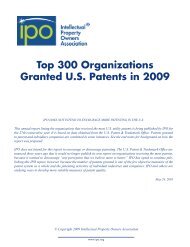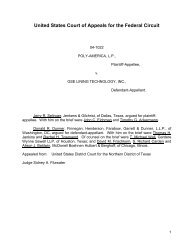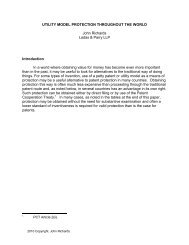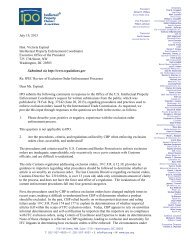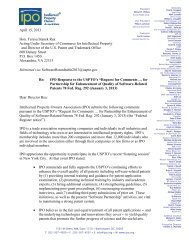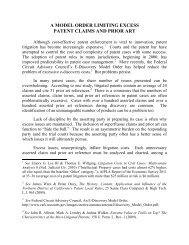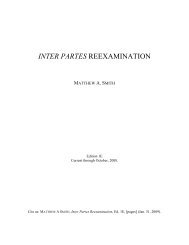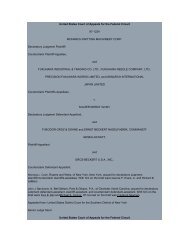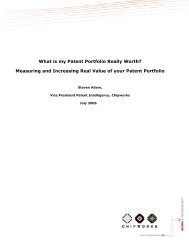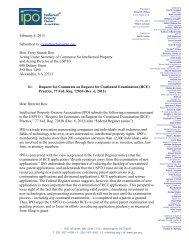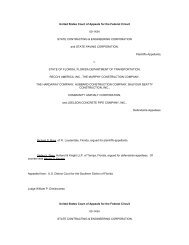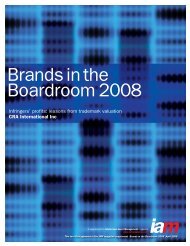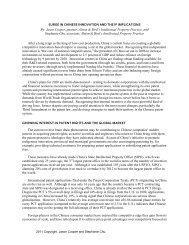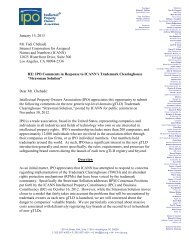Ruiz v. A.B. Chance Co.
Ruiz v. A.B. Chance Co.
Ruiz v. A.B. Chance Co.
You also want an ePaper? Increase the reach of your titles
YUMPU automatically turns print PDFs into web optimized ePapers that Google loves.
is successful in declaring a competitor’s patent invalid is a prevailing party for purposes of the<br />
rule. See Manildra Milling <strong>Co</strong>rp. v. Ogilvie Mills, Inc., 76 F.3d 1178, 1183, 37 USPQ2d 1707, 1711 (Fed. Cir.<br />
1996). An award of costs under Rule 54(d)(1) falls within the discretion of the trial court.See id. ("[E]ven if a<br />
party satisfies the definition of prevailing party, the district court retains broad discretion as to how much to<br />
award, if any.").<br />
In this case, <strong>Ruiz</strong> and Fasteel prevailed on the patent invalidity issue, but <strong>Chance</strong> prevailed on all of the<br />
other issues, including the non-patent issues. The district court did not err in refusing to award costs, for<br />
neither party prevailed sufficiently to require an award of costs and make a decision not to do so an abuse of<br />
discretion.<br />
V. Non-Patent Claims<br />
<strong>Ruiz</strong> and Fasteel also cross appeal the district court’s grant of summary judgment on their non-patent<br />
claims. "Summary judgment is appropriate when there is no genuine issue as to any material fact and . . .<br />
the moving party is entitled to judgment as a matter of law." Fed. R. Civ. P. 56(c). Summary judgment is<br />
inappropriate "if the evidence is such that a reasonable jury could return a verdict for the nonmoving<br />
party." Anderson v. Liberty Lobby, Inc., 477 U.S. 242, 248 (1986). When deciding a summary judgment<br />
motion, all of the nonmovant’s evidence is to be credited, and all justifiable inferences drawn in the<br />
nonmovant’s favor. See id. at 255. We review a district court’s grant of summary judgment de<br />
novo.See Celotex <strong>Co</strong>rp. v. Catrett, 477 U.S. 317, 323 (1986).<br />
A. Discrimination under 42 U.S.C. § 1981<br />
<strong>Ruiz</strong> and Fasteel allege that <strong>Chance</strong> terminated the Distributorship Agreement in violation of 42 U.S.C. §<br />
1981 (1994), because <strong>Ruiz</strong> is Hispanic. 42 U.S.C. § 1981 provides that all persons within the jurisdiction of<br />
the United States "shall have the same right in every State and Territory to make and enforce contracts . . .<br />
as is enjoyed by white citizens." "[I]dentifable classes of persons who are subjected to intentional<br />
discrimination solely because of their ancestry or ethnic characteristics" enjoy protection under section<br />
1981. St. Francis <strong>Co</strong>ll. v. Al-Khazraji, 481 U.S. 604, 613 (1987). UnderMcDonnell Douglas <strong>Co</strong>rp. v. Green, 411<br />
U.S. 792 (1973), in order to establish a section 1981 case, <strong>Ruiz</strong> must first establish a prima facie case of<br />
discrimination by showing: 1) he fell within a class of persons protected under section 1981; 2) Fasteel met<br />
the necessary qualifications to be a <strong>Chance</strong> distributor; 3) Fasteel’s ability to make and enforce contracts<br />
was adversely affected by <strong>Chance</strong>’s actions; and 4) there was evidence that <strong>Chance</strong>’s actions were<br />
motivated by animus based on national origin. See Barge v. Anheuser-Busch, Inc., 87 F.3d 256, 258 (8th Cir.<br />
1996). In analyzing <strong>Ruiz</strong>’s and Fasteel’s claim, the district court assumed that appellees had made out a<br />
prima facie case, thus entitling them to a rebuttable presumption of discrimination. See Tex. Dep’t of Cmty.<br />
Affairs v. Burdine, 450 U.S. 248, 254 (1981).<br />
In order to rebut the presumption of discrimination arising out of establishment of a prima facie case,<br />
<strong>Chance</strong> must advance a legitimate, non-discriminatory reason for its actions. See St. Mary’s Honor Ctr. v.<br />
Hicks, 509 U.S. 502, 506-08 (1993). <strong>Chance</strong> only has a burden of production, not persuasion. See id. at 509.<br />
If <strong>Chance</strong> produced a legitimate, non-discriminatory reason for its actions, <strong>Ruiz</strong> and Fasteel could still<br />
prevail by proffering evidence that <strong>Chance</strong>’s reasons for its actions were a pretext for<br />
discrimination. See Burdine, 450 U.S. at 253. <strong>Ruiz</strong> and Fasteel bear the burden of establishing the existence<br />
of facts which, if proven at trial, would permit a jury to conclude that intentional discrimination was the true<br />
motivating force behind <strong>Chance</strong>’s actions. See St. Mary’s Ctr., 509 U.S. at 507-08.<br />
The district court found that <strong>Chance</strong> offered a legitimate, non-discriminatory reason for its actions. <strong>Chance</strong><br />
terminated Fasteel because "<strong>Ruiz</strong>, Fasteel’s sole owner, was not using his best efforts to support<br />
defendant’s business, as exemplified by <strong>Ruiz</strong>’s involvement with Ram Jack." The district court also found<br />
that <strong>Ruiz</strong> and Fasteel failed to offer evidence demonstrating that <strong>Chance</strong>’s reason was pretextual. <strong>Ruiz</strong> and<br />
Fasteel argue that <strong>Chance</strong>’s reason was pretextual because: 1) Fasteel never directly dealt in products<br />
competitive to <strong>Chance</strong>’s; and 2) other <strong>Chance</strong> dealers and distributors sold competitive products and<br />
<strong>Chance</strong> did not terminate them. The district court found that although there was evidence suggesting that<br />
some of <strong>Chance</strong>’s dealers and distributors carried competitive products, <strong>Ruiz</strong> and Fasteel failed to show that<br />
the other dealers and distributors were similarly situated to <strong>Ruiz</strong> and Fasteel. See Ghane v. West, 148 F.3d<br />
979, 982 (8th Cir. 1998) (although instance of disparate treatment can support a claim of pretext, the plaintiff<br />
has the burden of showing that he is similarly situated in all relevant respects to the individuals treated more<br />
favorably). The district court also found that <strong>Ruiz</strong> and Fasteel failed to offer any evidence that <strong>Chance</strong>



